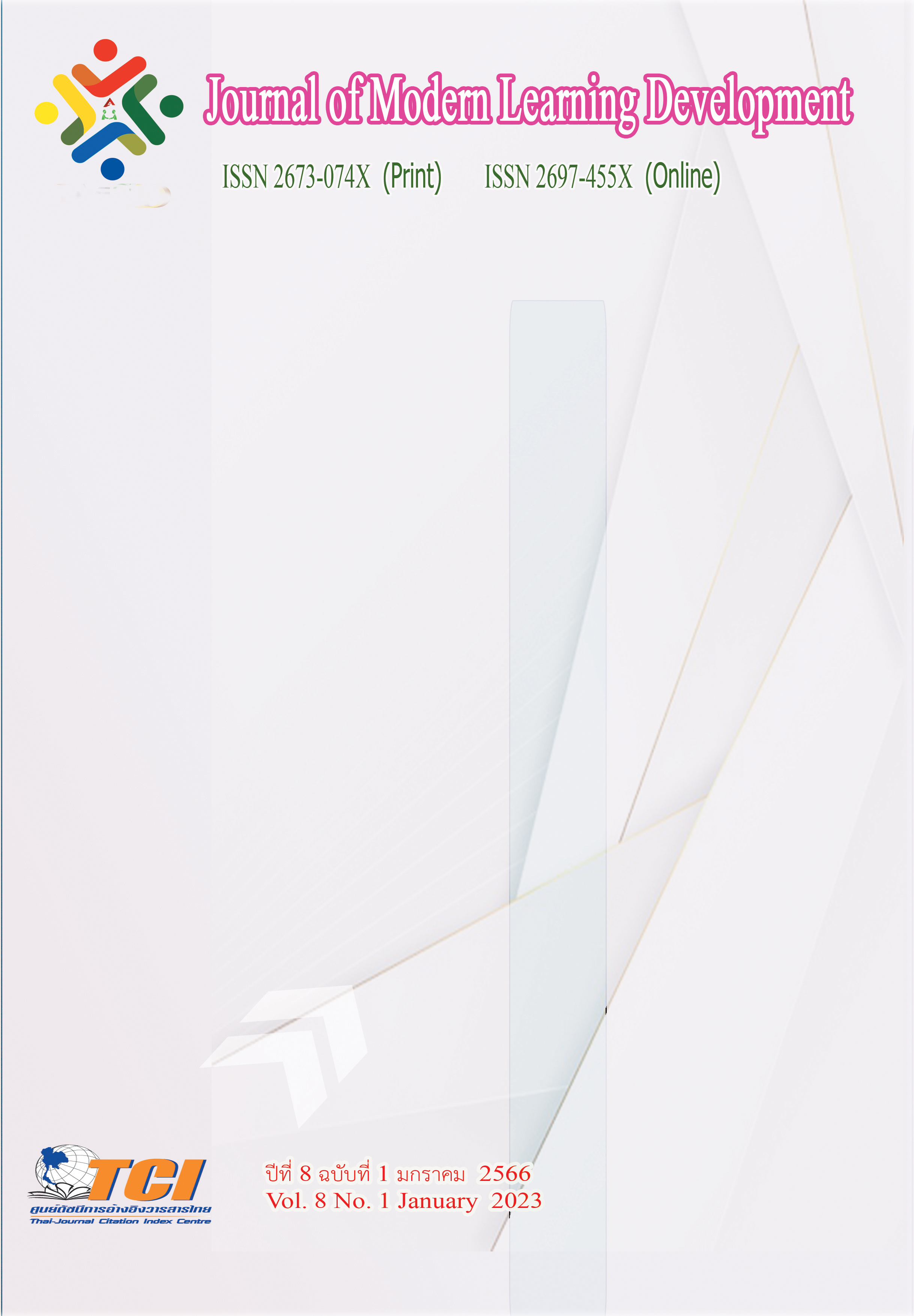Guidelines for enhancing of desirable leadership skills in the new era of the Royal Thai Army: a case study of an army camp in Khon Kaen province
Main Article Content
Abstract
Thailand has radically changed and The Attitude of Society are influenced by Thailand changed. As can be seen from many different opinions in the Internet or advancements in information technology. Leadership skill can be adjustable according to the situation and the organization are the driving force for success. The purpose of this study was to study the guidelines for enhancing desirable leadership skills in the new era of the Royal Thai Army: a case study of an army camp in Khon Kaen Province, Factors in enhancing desirable leadership skills, The current situation of an army unit in Khon Kaen by analyzing the SOAR and Guidelines for enhancing of desirable leadership skills in the new era of the Royal Thai Army: a case study of an army camp in Khon Kaen province. The study with 120 samples. An online questionnaire was used as a data collection tool. The results showed that the most important factors influencing leadership were empathy and respect for others (mean 4.23) and supervisor support (mean 4.23). Working with transparency and accountability (mean 4.30), discipline (mean 4.39), punctual (mean 4.38), patience (mean 4.37), responsible (mean 4.37), courage (mean 4.28), selfless (mean 4.29), positive attitude (mean 4.25), compassion and generosity (mean 4.25), moral and ethical (mean 4.25), trustworthy (mean 4.25), behavior a good role model (average 4.24) and provides help or support to get the job done (mean 4.21). When the results were analyzed together with the SOAR analysis. This made it possible to design 3 projects to enhance leadership skills in the new era, namely Project 1, training courses on modern human resource management. Focus on the development of knowledge skills. The ability to work and in the field of management. Project 2 Develop the character of leadership focus on developing leadership skills along the way. Project 3, Good Leader, Good Follower, focuses on developing the leadership qualities of commissioned officers. And extending the results to all military generals results from the project. As a result, the personnel who received the training gain experience and new knowledge has the potential to increase work, have a psychological development. Changes to work for the better and can clearly be a good role model for subordinates.
Article Details
References
เกียรติศักดิ์ กวีวรญาณ. (2555). แนวทางการพัฒนาบุคลากร เพื่อเสริมสร้างสู่ภาวะผู้นำ (ระดับบุคคล) โดยใช้เครื่องมือ Appreciative Inquiry กรณีศึกษา บริษัท ทริปเปิลที บรอดแบนด์ จำกัด (มหาชน) จ.นครราชสีมา. สารนิพนธ์บริหารธุรกิจมหาบัณฑิต สาขาวิชาการจัดการ. บัณฑิตวิทยาลัย: มหาวิทยาลัยขอนแก่น.
ชนิดาภา หินเธาร์. (2559). การศึกษาแนวทางการพัฒนาภาวะผู้นำที่พึงประสงค์ โดยกระบวนการสุนทรียสาธก ของบุคลากรสายสนับสนุน มหาวิทยาลัยเทคโนโลยีราชมงคลอีสาน วิทยาเขตขอนแก่น. สารนิพนธ์บริหารธุรกิจมหาบัณฑิต สาขาวิชาการจัดการ. บัณฑิตวิทยาลัย: มหาวิทยาลัยขอนแก่น.
นันทวัน อินทชาต. (2560). การวิเคราะห์องค์ประกอบของคุณลักษณะที่พึงประสงค์ของผู้นำทางทหารในมุมมองของนักเรียนนายเรืออากาศ โรงเรียนนายเรืออากาศนวมินทกษัตริยาธิราช. วารสารวิชาการศิลปศาสตร์ประยุกต์. 28 (3), 36-46.
ปิยะทัศน์ พาโสมมนัสสกุล. (2558). การพัฒนาสถานศึกษาโดยผู้นำพลังบวกด้วยวิธีการสุนทรียสาธก กรณีศึกษาโรงเรียนเอบีซี อำเภอกระนวน จังหวัดขอนแก่น. เอกสารประกอบการประชุมวิชาการทางธุรกิจและนวัตกรรมทางการจัดการระดับชาติและนานาชาติ ประจำปี 2558. ขอนแก่น: มหาวิทยาลัยขอนแก่น. 257-293.
พร ภิเศก. (2556). แนวทางการพัฒนาสมรรถนะผู้สำเร็จการศึกษาจากโรงเรียนนายร้อยพระจุลจอมเกล้าและโรงเรียนนายสิบทหารบก เพื่อให้ปฏิบัติหน้าที่ผู้นำหน่วยทหารขนาดเล็กได้อย่างมีประสิทธิภาพ. กรุงเทพมหานคร: ศูนย์พัฒนาหลักนิยมและยุทธศาสตร์กรมยุทธศึกษาทหารบก.
สุเทพ พงศ์ศรีวัฒน์. (2550). ภาวะความเป็นผู้นำ. กรุงเทพมหานคร: เอ็กซเปอร์เน็ท.
เอกราช ทองชั้น. (2556). แนวทางการพัฒนาภาวะผู้นำที่พึงประสงค์ของผู้บริหาร บริษัทเบทาโกรเกษตรอุตสาหกรรม จำกัดสำนักงานนครราชสีมา โดยวิธีสุนทรียสาธก. สารนิพนธ์บริหารธุรกิจมหาบัณฑิต สาขาวิชาการจัดการ. บัณฑิตวิทยาลัย: มหาวิทยาลัยขอนแก่น.
Dubrin, A.J. (2013). Leadership: Research Findings, Practice, and Skills. 7th ed. Australia: Cengage Learning.
Hersey, P., & Blanchard, K.H. (1974). “So you want to know your leadership style?”. Training & Development Journal 28 (2), 22-37.
Sekaran, U. and Bougie, R. (2016) Research Methods for Business: A Skill-Building Approach. 7th Edition, Wiley & Sons, West Sussex.


